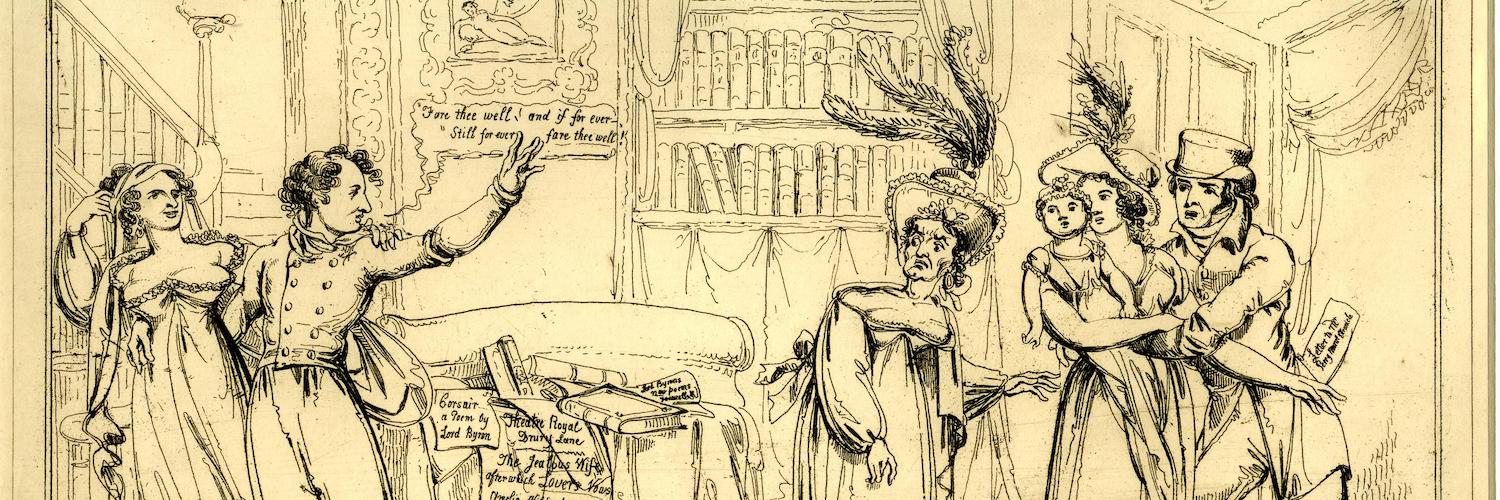When Byron sent a copy of his first publically printed volume, Hours of Idleness, to his ineffectual guardian, Lord Carlisle, the elder poet evaded an assessment of the poems by writing his thanks in advance of (and perhaps entirely in lieu of) reading the poems. Carlisle assured Byron that however the public and reviewers received the volume, Byron “will stand better with the world than others who only pursue their studies in Bond St. or at Tatershall's” (Byron, Works 1:138) Poetry, Carlisle suggests, may not be actual labor, but it is better than dissipating consumption on Bond Street, a high-end shopping district, or horse racing and gambling at Tattersall's. This tepid response, with its emphasis on the “studies” of other aristocrats, underscores Carlisle's frustration with Byron's indifference to his studies at Cambridge. Henry Brougham's review of Hours in the Edinburgh Review, urges Byron to “forthwith abandon poetry, and turn his talents, which are considerable, and his opportunities, which are great, to better account” (ER 9: 286). Like Carlisle, Brougham raises the issue of the public perception of aristocratic labor, a subject that provoked both class-based and party-affiliated responses that ranged from anger to amusement. Reviews, both positive and negative, registered the issue, which was signaled not only by the title's emphasis on “idleness,” but the Preface's insistence on Byron's status as a poetic dabbler. Byron's public performance, thus, is refracted through competing understandings of the relationship between class privilege and forms of labor, both working-class and professional.
Among the most virulent of the reviews was the notice by Hewson Clarke, who was at Cambridge at the same time as Byron, in the first issue of The Satirist, or the Monthly Meteor (this summary of Clarke's review draws from my longer account of it in British Periodicals 142-6). Probably suppressing a personal knowledge of the identity of the reviewer, Byron's main complaint about the review, expressed to Elizabeth Pigot, is that “my censor only quotes two lines from different poems” to support his position (BLJ 1:136). This charge is somewhat imprecise, and the Satirist's weird quotation makes the review potent. The Satirist, emphasizing the name's absence from the annals of accomplishment, quotes six times (once in the possessive case) the full denomination of the author announced on the title page: “George Gordon Lord Byron, a minor” (1: 77-81). This repetition (of a pseudo-trimeter line of amphibrachs, with strong caesuras emphasizing the rhythm) asserts the mannered construction not only of the poetry, but of Byron's self-conception. As Jerome Christensen has noted, Henry Brougham, writing several months later in the Edinburgh, exploited the tension between Lordship and minority (21-23), and, like Hewson, queried the relevance of either to poetic production.
Clarke's review begins, “There certainly must be a wonderful charm in the name of author, and a prodigious desire in men to see their own works in print, or what could have induced George Gordon Lord Byron, a minor, to have favoured the world with this collection of poems” (Satirist 1:77). Drawing on his own experience as a young author, Clarke adumbrates the method of the “wonderful charm” in which “print” becomes a mirror in which men can “see” their works—and work—materialized, yet such sight can be a delusion. Using the charmed “name of author” to undercut the awkward amalgam that identifies Byron particularly, the reviewer insists on his right to regulate excess and authenticity. The Satirist reads Hours of Idleness as self-exposure that confirms Byron's inability to produce and not as his record of the poetic process of transforming idle moments into verse: if Byron had not published, “no human being would have guessed the quantity of time he had spent in doing nothing.” For the Satirist, Byron's minority is not, as Byron himself positions it, an anteroom to lordship, but an expression of his personality. The Satirist's review mentions thirteen poems, nearly the most of any notice of Hours, while paraphrasing or, as Byron complains, quoting short phrases. In the paragraph on “On a Distant View of the Village and School, of Harrow, on the Hill,” Clarke reduces its title to “Harrow on the Hill,” collapsing the poetic distance and distorting Byron's generic signals. Such a reduction strips “On a Distant View” of its ironic perspective and represents, as the poem's central point, Byron's notion that “he spoke better than Mossop, and acted better than Garrick” (Satirist 1:78). In context, the poem's point is that such sensations of fame occur by confusions of scale—mistaking (even while cognizant of the mistake) the school auditorium for Drury Lane and thereby mishearing the conventions of applause:
While, to swell my young pride, such applauses resounded,I fancied that Mossop himself was outshone... fir'd by loud plaudits, and self adulation,I regarded myself as a Garrick reviv'd.(18-23)
The comparison with Mossop creates a fantasy of fame that the poem discounts but which the review attributes to Byron. Byron saw, in Clarke's review, the fragility of his public self, because the redeployment of his words altered his character and exposed his anxieties about, and commitments to, that character. “Harrow” is, in part, a meditation on the mechanism of the “wonderful charm” of authorship, in which applauses are reiteratively resounded, both seductive and treacherous, yet Clarke insists that Byron is oblivious to and enthralled by this “charm.” Byron read the Satirist review within a few weeks of its appearance and wrote to Elizabeth Pigot about it on October 26, 1807. The letter compares Cambridge to Southwell, before discussing the Satirist: “This place is wretched enough...Oh! the misery of doing nothing but make Love, Enemies, and Verses” (BLJ 1:135). “This place” is where Byron encountered Hewson Clarke, and the phrase “doing nothing” echoes the Satirist's accusation of Byron's idleness. But Byron's “doing nothing” is supplemented— stylized—by his making “love, enemies, and verses.” The asymmetrical meanings of “making” as applied to each of the nouns gives it triple meaning, and signals the serial nature of Byron's own construction as a form of valid labor, of continual and varied “making.”
From its inaugural issue, in which it skewered Hours of Idleness, The Satirist both reviewed Byron's work and injected sightings of Byron into its social commentary. Spurred in part by personal animosity between Byron and Hewson Clarke, these references often played on private information, and functioned to expose Byronic nonchalance as a façade for ambition and privilege, thereby producing a competing version of Byronic celebrity to that produced by Byron.
When Byron published the next edition of Hours, retitled Poems, Original and Translated, in 1808, he dropped the appellation “a minor” as well as the Preface and several poems. The Satirist, nonetheless, revives the title in its review of the newer volume, and continues to refer to him as “George Gordon, Lord Byron, a Minor.” The review invents the title “Prayer of George Gordon, Lord Byron, a Minor” for [ “May Heaven so guard my lovely Quaker” ] (3:82). Further insisting on the durable trace of Idleness, this review discusses—and quotes at varying lengths—six of the poems omitted from the Poems, Original and Translated. While Byron's career flees from Hours, the Satirist maintain its centrality to Byronism, even after Clarke had left the journal, because of its affinity with the journal's construction of the Whig aristocracy as enablers of fictitious labor. In the March, 1808 number, the Satirist publishes a correspondent's praise, “Address to the Satirist,” which begins “Health to the Satirist! Whose daring hand/Scourges the rampant follies of the land” (2: 7). Almost certainly written by Clarke, the poem associates the Satirist's attacks on idle poetry with its repudiation of the “All the Talents” government led by the Whig Lord Grenville. Framed by two articles— “The School of Eloquence and Grace” and “Female Costume” —that demonstrate the connections between economic activity and personal perceptions and experiences, the poem, with guiding footnotes, references Mr. Satirist's many cuts from prior reviews, political and poetical. In contrast to the characters of the surrounding articles, the poem argues for a consistency in the Satirist that runs contrary to contemporary society. He “Gives to each author's work strict review:/ Whether a Lord step forth, whose Idle Hours,/ Display, midst petty wits, his minor powers” (2: 8). The “petty wits” invoke the scene of Cambridge elites who scorned Hewson Clarke and clustered around Byron. In the May, 1808 number, the Satirist compiles snippets that review “Hours of Idleness, a Series of Poems; by George Gordon, Lord Byron, a Minor,” ranging from the British Critic's “this is very ingenious Idleness” to the Monthly Mirror's “This Minor certainly is a minor poet at present; and will, we think, at any age continue to be so.” It concludes by quoting the Edinburgh Review on “the noble Minor's volume,” whose Ossianic poetry is “stupid and tiresome” (335).
Hewson Clarke, as a sizar at Emmanuel College had, at least potentially, to work for his reduced expenses. He would have been among the poorer students, and, in considering himself a writer, would have recognized Byron as a local rival. Byron, by contrast, affected a complete indifference for Clarke, except in his character as a writer in The Satirist, although in a footnote to English Bards, Byron notes that Newcastle, “the town in whose markets he [Clarke] had sold meat, and in whose weekly journal he had written, deserved better treatment” than it is given in Clarke's later writing (124), a comment that registers, and personalizes, Clarke's class politics. Ben Wilson notes that Clarke worked as “an errand boy at a chemists” while writing “satires for The Tyne Mercury” and, once at Cambridge, “developed a lasting and fathomless enmity toward the upper class” (173). In the March 1808 issue of The Satirist, the first of an extended sequence, “The Cantab” appeared; it ran until its ninth number in February, 1809, and represented itself as debunking the myth of Cambridge maintained “by the visionary retrospections of its departed members” (2:42). In “Cantab VIII,” both “Lord B—“ (with his bear) and Mr. Hewson Clarke” appear, the former rescuing his “chere amie” from a fire and the latter completing his “Art of Pleasing” (3:478). These articles drew on Clarke's experiences, though they projected his own dissipation (some of which Cyrus Redding recounts in Fifty Years' Recollections; 1: 245-6) onto others, as when another student harasses his patron for funds. In the first number, he sets the intellectual standard: “A student generally comes to the university with a sufficient knowledge of the classics, and if he be not ruined by the dissipation of the place, he may easily retain it” (2:43). Throughout, especially as it is highlighted by the Satirist's Tory leanings, the series connects college dissipation with Whig ambitions, and underscores the problems of aristocratic labor, which is associated with the Whigs' indolence as a party indifferent to workers but mired in the abstractions of political economy (see figure one).
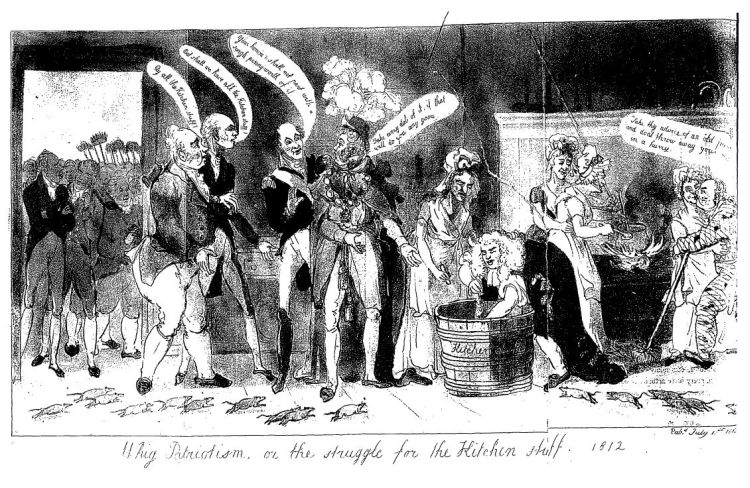
Fig. 1 The Satirist on Whig economics, manners, and morals.
Source Citation: The Satirist, or Monthly Meteor. 1812. London, 1812. The Making of the Modern World. Gale 2009. Gale, Cengage Learning. Vanderbilt University. 04 May 2009
In the June, 1808, Satirist, Clarke published, as part of “Cantab No. 3,” a parodic “Student's Memorandum-Book,” which begins with an editorial introduction dividing Cambridge students into three groups: “the studious, the idle, and the profligate” (364). The time of the first is spent examining Newton, of the second in “doing nothing,” and that of the “profligate in drinking, wh[orin]g, betting, &c, &c.” This language locates Byron among the idle, and more, makes him representative of a social class for whom idleness constitutes character. The memorandum book covers roughly a week in the life of the profligate student, Sir G W, that is, Sir Godfrey Webster, Lady Holland's son (whom Lady Caroline Lamb would satirize in Glenarvon along with Lord Byron, for much the same reasons if with only a shadow of the passion; like Buchanan, his pseudonym in Glenavron, Godfrey “only came alive while driving at top speed through town, or conversing with famous pugilists” [Wilson 176]).
On Monday, G.W. wakes at noon with a “D[amne]d headache,” an in medias res opening that hints at epic struggles the prior night. Later that day, he meets up with “Hell Fire Dick,” one Richard Vaughan, whom Robert Dighton painted in “A View of the Telegraph” (1808) and Egan applauded in Real Life in London. The driver of the Cambridge Telegraph, Hell Fire Dick was, according to Francis Grose's 1811 Dictionary of the Vulgar Tongue, “the favorite companion of the University fashionables, and the only tutor to whose precepts they attend.” According to Lewis Benjamin, “it was a fad of many beaux to dress as stage-coachmen and to imitate their conversation and habits,” even going so far as to drive private vehicles to “pretend to deliver parcels” (a practice to which Byron alludes in his 1813 “The Devil's Drive” [1: 206-7]). Our Student, then, unwilling to perform labor, instead chooses to imitate it; his being is constituted by a satirical relation to work, both his own (as a nascent Whig propagandist) and that of others. The next day, the student receives bills for “whips, dogs, etc. etc.,” and for six “interviews” with “Fanny W[e]lls” Despite his being broke, the last of these is easily handled—he sends her wine and a broach, but for the other debts, he must write his guardian, to whom he argues that his “tutor knows it is proper for me to have the wherewith to be in a genteel way,” and that requires ready money. On Wednesday, he stumbles across the Dean of his College, who gives him “an imposition out of some stuff or other called the Rambler.” As Clarke himself had published the Saunterer, a deliberate echo of Johnson's Rambler, when at Cambridge, Webster's literary ignorance is aligned with his idleness and his Whig perspective. Instead of reading Johnson, Webster is taken by “Devilish funny caricatures” and a “d[amne]d clever thing” by Lord Byron, “Lord Byron to his Bear” , which the idle poet sings to an adoring audience of young men:
Sad Bruin, no longer in woods are dancing,With all the enjoyments that Love can afford:No longer thy consorts around thee are prancing,Far other thy fate—thou art slave to a Lord!How oft when fatigued, on my sopha reposing5Thy tricks and thy pranks rob of anguish my breast;Have power to arouse me, to keep me from dosing,Or, what's the same thing, they can lull me to rest.But when with the ardours of Love I am burningI feel for thy torment, I feel for thy care;10And weep for thy bondage, so truly discerning,What's felt by a LORD, may be felt by a BEAR! (368)
A footnote points out that the bear is “a great favorite of his Lordship's” and, “if report say true, he has been seen to hug it with all the warmth of fraternal affection!"
Once master of his own domain of “consorts,” the bear is now “slave to a Lord.” Such slavery, a subjugation of labor to lordship, imputes to Byron and his fellow students an indifference to the bear's—or any laborer's—rights. The second stanza equates the bear's pranks with Byron's own poetry, equally likely to arouse and to lull to sleep. The Satirist had, in both its reviews of Hours of Idleness, indicated the dullness of Byron's work and its soporific effect. In the final stanza, the juvenile Byron makes the great discovery of sympathy: the bear's enslavement to him is parallel to Byron's enslavement to love. Of course, this is once again a misunderstanding of the laboring class, as the bear's subjugation is inflicted upon it, while Byron's is merely a stylistic choice of his, evident in the conventionality of his poetry.
In the July, 1808 issue, an article mockingly defends the “Whip and Varmint Clubs,” clubs of mostly students who dash around in their coaches and “may achieve great advantages to their country, by breaking the necks of a few of the useless mortals who are merely fruges consumere nati,” that is, those born only to consume (figure two).
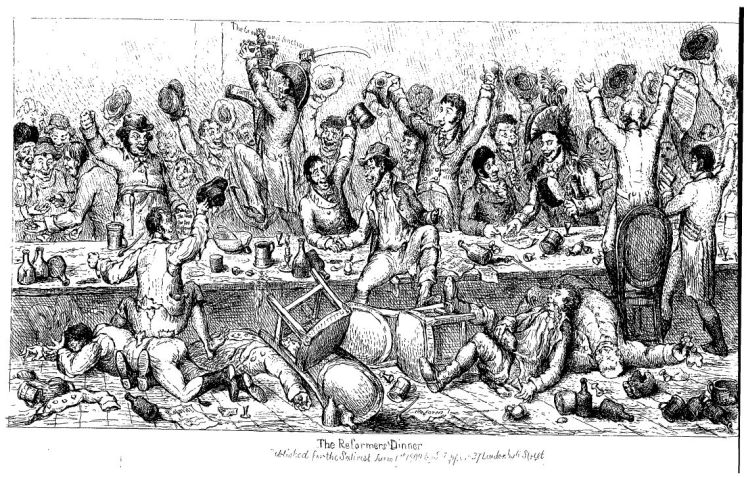
Fig. 2 The Reformers Dinner, an illustration from The Satirist. The Satirist, or Monthly Meteor. 1809. London, 1809. The Making of the Modern World. Gale 2009. Gale, Cengage Learning. Vanderbilt University. 04 May 2009 http://galenet.galegroup.com.proxy.library.vanderbilt.edu/servlet/MOME?af=RN&ae=U3608326016&srchtp=a&ste=14
Although the Satirist does not go so far as to place the empowered Whigs in this camp, it does suggest that, just as some Cambridge scholars are best suited for merely racing around in coaches, Whigs, too, have their ideal, Platonic professions: “Mr. Sheridan ..as a mountebank, Mr. Windham admired as a conjurer, Lord Grenville celebrated as a Roman Catholic Priest, Lord Temple eminent as a stationer, Lord Petty unrivalled as an opera dancer, Mr. Walter Scott [thrown in with the Whigs either through ignorance, because of his association with the Edinburgh Review, or as wit] excellent as a compiler of nursery tales, and George Gordon, Lord Byron, a minor,...as the keeper of a bear-garden” (489). Guided by the sound echo of “Whig club” and “Whip Club,” the Satirist, as it does elsewhere, associates Whig theorizing with unregulated consumption and undisciplined governance. In its satiric voice, the article notes it can only discover “one adverse effect” of such clubs, a “want of employment to those who drive not for notoriety but for bread.” The club, however, is alert to this problem and “keeps up the spirits of desponding stage and hackney coachmen” by “frequently treat[ing] them to a ride in their dashing barouches, and giv[ing] them as much gin and bitters as they can drink.” The article turns next to the “Varmint Club,” founded by Lady Holland's son, Godfrey Webster, our student who so much admired Byron's song to his bear and whom Clarke would, in the Scourge, associate with the economic disaster of paper money, an institutionalized form of false promises and unrestrained consumption. Webster's club, again, impersonates labor, choosing to dress with “hats...never exceeding three and sixpence and...all their other habiliments...proportionally cheap.” Clarke's commentator wonders that so few ladies are attracted to these “gentlemen rat-catchers”: “We heard a lovely girl (no relation to Lord Byron) declare, that she would sooner marry a bear than a barouche driver...perhaps she wished to keep the whip and reins in her own hands” (491; figure three).
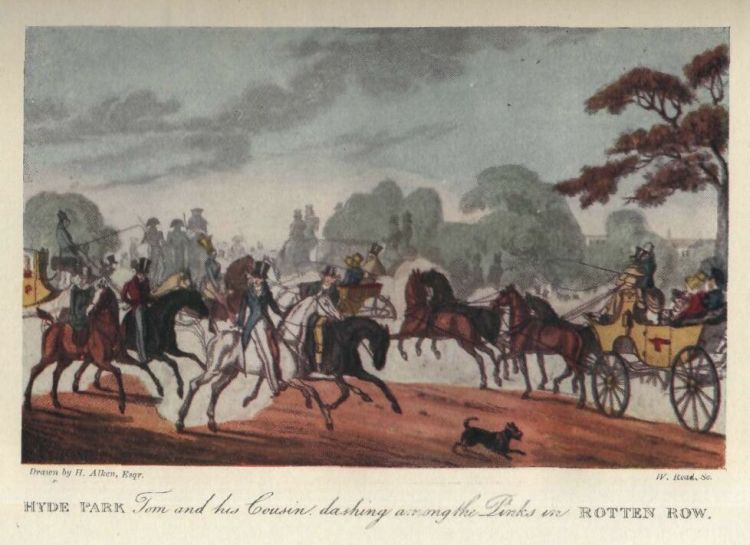
Fig. 3 Two illustrations from “Real Life in London” showing gentlemen racing carriages. (Project Guttenberg)
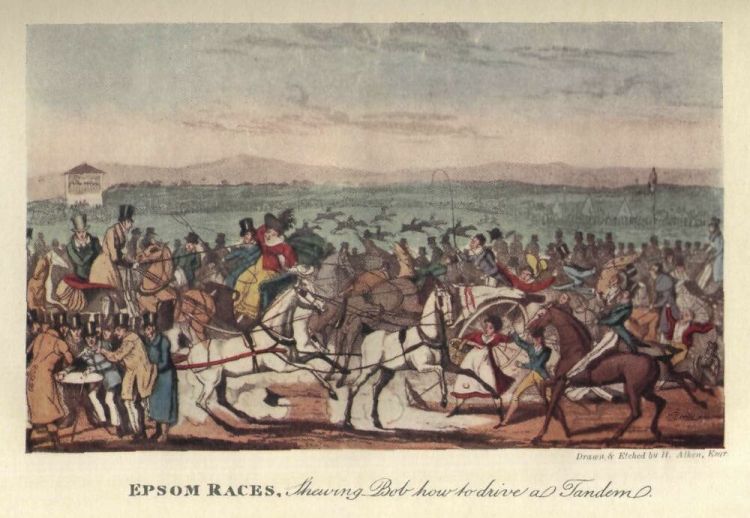
The following month, the review of Poems, Original and Translated appeared. The Satirist was one of the few journals to review both versions. Clarke asked pardon for again intruding on the public “this eccentric minor poet;—but stay, ladies, stay, 'tis a truly harmless Lord, now—he is without his Bear, and is himself muzzled” (3: 78). This review divides Byron into two corporate entities, the minor Lord who produced Hours and “Bruin and Co.,” the somewhat wiser, though no more poetic, construct, disciplined by the periodicals which are given credit for Byron's deletions in the new edition. In the December issue of 1808, a correspondent named “An Alarmist”—consistent in tone with Hewson's Clarke's work, and probably his—writes Mr. Satirist a “Warning”; it begins: “Are you mad, or have you as little feeling for yourself as you have for other people?..you have almost flayed your victims...till they have roared with the smart, and almost gone mad with pain...you had better look about you, Mr. Satirist, [to] escape in your whole skin.” On one hand, this parodies the corporate body, which has no “skin” but only a surface of paper. But it also plays on the exchange of madness and lashing between the Satirist and its victim-attackers. Who binds whom is determined by an economy of cultural production.
The correspondent declares, “I go nowhere now, indeed, but I hear you abused” (3: 467). This is hyperbole, increasing the presumed clout of The Satirist by making it the object of universal recognition, and to prove his case, he relays an impromptu, overheard conversation about the journal. A trio of a “gentleman in black,” a “sullen, male novelist,” and a “fine woman with very prominent beauties” agree, as the woman puts it, they must “join our forces to crush these fellows, or we shall positively be all Gothicized;” their anxiety—and therefore the Satirist's boast—is the control of a public image, to the extent that the novelist can no longer sell his work. As the conversation turns to defending the utility of Criminal Conversation (without which, a new interlocutor injects, “what would be the use of a pretty wife?”), another man then makes this appeal to a thus-far silent interlocutor: “ ‘You are an author, my Lord,' added he, turning to a man who was hanging on the arm of a tall masculine woman, that looked like a Holland frow; ‘suppose you were to take them in hand, and write them down.'” Noting that he is “just now going to Spain,” he replies he might do something “ ‘when I am half-seas over. I and my bear will be a match for them' exclaims [the] minor peer. ‘...And as for what they say of me, I don't care a d[amn].'” The man in black replies, with unintended irony, “Why, surely, it is not possible for them to libel you” (470). This might represent some rumored knowledge of the forthcoming English Bards and Scotch Reviewers in which Byron would skewer Hewson Clarke; Byron's letters reflect an anxiety about whether the secret of his poem would hold. In it, he wrote:
There [that is, at Cambridge] Clarke, still striving piteously 'to please',Forgetting doggerel leads not to degrees,A would-be satirist, a hired buffoon,A monthly scribbler of some low lampoon,Condemn'd to drudge, the meanest of the mean,5And furbish falsehoods for a magazine,Devotes to scandal his congenial mind;Himself a living libel on mankind.
Clarke responded to these verses (and a postscript equally vicious) in The Scourge with, as Peter Quennell put it, "a long, virulent and ill-informed discursion upon the poet and his entire family," to which Byron's immediate response was to institute a libel suite which he ultimately did not pursue (28).
Soon after this, Hewson Clarke, who never received his degree from Cambridge, left The Satirist and edited The Scourge, in which he wrote a libel that sufficiently infuriated Byron that he devised a challenge (that apparently went undelivered).
In response to English Bards, Clarke, in the March 1811 The Scourge, accused Byron of being “illegitimate descendant of a murderer” (1:191), prompting Byron to seek legal counsel regarding a law suit for libel, though that was quickly abandoned (Byron, Works 226).
The Satirist, now without Clarke, would go on to review, mostly favorably, Childe Harold, several of Byron's tales, and The Waltz (though probably without knowing Byron wrote it) before it folded in 1814. But the figure of “idleness” as the propensity of lordship was easily reinvoked, and constituted, for the journal, a recurrent critique. The reviewer of The Giaour concludes by suggesting that, while Byron is “reveling in all the sensual and intellectual luxury which the successful sale of Newstead Abbey has procured for you, you little think of the privations to which you have subjected us, unfortunate Reviewers; compelled...to subsist for a week on half our usual allowance of ‘broth and bullock's liver' in order to afford the expensive publication of 41 octavo pages of a ‘rivulet of text flowing through a meadow of margin'” (13 [n.s. 3]: 88-9). Even as the Tories reasserted governmental control with the establishment of the Regency, the Whig intellectual power, articulated in the Edinburgh Review and in the rising economic discourse, shifted the battle into a cultural war.
To conclude, I want to glance briefly at one final article. When Henry Pye died in 1813 and the office of Poet Laureate fell vacate, the following application was made to the Lord Chamberlain: “Having many hours of idleness upon my hands, and being an adept at versification, it would not be unacceptable to me to try the experiment of writing the Laureate Odes” (13 [n.s. 3]: 246) The author's rationale was that “Being in politics between a Whig and a Jacobin, the subject of our Sovereign's praise will have so much of the Romaunt in my eyes, as sufficiently to resemble that species of composition in which I am most successful.” Signed simply “ Byron,” the signature is in marked contrast to the next applicant, who ends,
I am,My Lord,With the utmost gratitude,Respect, and admiration,Your Lordship'sMost obedient, devoted,And very humble servant,W. Wordsworth.
This parodic Byron argues the value of the Laureateship will be to “kill the ennui by which I am devoured”; he maintains that “Wine I now loath—money I detest—praise is irksome to me—and the world only one dull round of apathy and misanthropy.” Just as the earlier Byron of Hours of Idleness positions poetic production as a form of self-amusement, this Byron positions the laureateship as appropriate for him, precisely for his indifference to its rewards. By comparison, Wordsworth's sample poem is a montage of various poems, remarking:
Sack and a salary are “there,Few visions have I seen more fair;”and“My heart leaps up when I beholdAn office rear'd on high:”5and concluding:The child is father of the man;And I could wish my days to be
Bound each to each by” Sack and Salary.
These two applications are among the “twelve” that the Satirist denotes as the best among the thousands made. Among the applicants were Walter Scott and Robert Southey. Walter Scott's letter is among the most financially astute: “I begin to be afear'd that the Booksellers will soon think meet to retrench in the purchase of my ballads,” so “I submit my claims to your judgment, as a Candidate for a hundred pounds sterling per annum, and a butt of good sack,...on condition of furnishing a certain quantum of rhyme, at which your Lordship may have heard I possess great alacrity.” This is a great image of the competitive marketplace of fame, matching Scott, Southey, Byron, and others against one another. It is, alas, like the fabulous image from the 2002 Observer that begins Tom Mole's book on Byron's fame, of girls screaming at his poetry readings (xi; presumably to Ringo's back beat). Neither happened.
There was, of course, no application process for the Poet Laureate, but in imagining it, the Satirist constitutes poetry as a professional market, allied tightly with other government offices. Its proposal is to form a committee of the twelve best, to replace the single laureate (and divide the emolument evenly among them to curtail expenses). When Walter Scott received, to his declared surprise, the offer of the Poet Laureateship, he declined and, with apologies, wrote Southey that he had hinted to Croker that Southey should take up the laurel. Of course, the closest Byron came to the laureateship were his satires on and of Robert Southey. But Mr. Satirist, if making up the scene, caught the emerging dynamic of the literary marketplace, and—caught in it as he was, with his own journal on the financial ropes—recognized the need, the gain, even the inevitability of bringing the poets—even Lord Byron who had refused the profits of his first works—into its sphere. Such competition provided both a ready comparison and a proxy for the political skirmishes between Whigs and Tories.
If the initial skirmishes I have traced can be viewed as the juvenile squabbling of two under-achieving Cambridge students, their escalation into battles on and of the national stage signaled not only the maturing of George Gordon, Lord Byron, a minor, but of his rivals and the poetic marketplace.
Works Cited
- Lord Byron's Pilgrimage to the Holy Land 1817. London: J. Johnson.
- The Beaux of the Regency 1908. London: Hutchinson. 2 vols.
- Works of Lord Byron Coleridge, E. H., Porthero, R.E. (eds.) 1898-1905. London: John Murray. 13 vols.
- English Bards and Scotch Reviewers Stephen, Leslie (ed.) 1907. New York: Macmillan.
- Byron's Letters and Journals March and, Leslie (ed.) 1973-82. London: John Murray. 12 vols.
- A Literary History of Cambridge Rev. Ed.. 1995. New York: Cambridge University Press.
- Lord Byron's Strength: Writing and Commercial Society 1993. Baltimore, MD: Johns Hopkins University Press.
- Nineteenth-Century Poetry and Literary Celebrity 2009. New York: Palgrave.
- Graham, Peter (ed.) Byron's Bulldog: Letters of John Cam Hobhouse to Lord Byron 1984. Columbus, OH: The Ohio State University Press.
- 1811 Dictionary of the Vulgar Tongue [Lexicon Balatronicum]; a Dictionary of Buckish Slang, University Wit, and Pickpocket Eloquence. Compiled Originially by Captain Grose with Modern Changes and Improvements by a Member of the Whip Club, Assisted by Hell-Fire Dick, and James Gordon, Esqurs of Cambridge...[First Edition: Classical Dictionary of the Vulgar Tongue 1785]. 1811. London: C. Chappel.
- “Peacock's Sir Oran Haut-ton: Byron's Bear or Shelley's Ape?” Keats-Shelley Journal 1980. vol. 29 pp. 173-90.
- Byron's Romantic Celebrity: Industrial Culture and the Hermeneutics of Intimacy 2007. New York: Palgrave.
- Byron: The Years of Fame 1935. New York: Viking Press.
- Fifty Years' Recollections, Literary and Personal, with Observations on Men and Things 1858. London: Skeet. 3 vols.
- British Periodicals and Romantic Identity: The "Literary Lower Empire" 2009. New York: Palgrave.
- “Tainted Love and Romantic Literary Celebrity” ELH 2007. vol. 74 no. 1 pp. 59-88.
- The Making of Victorian Values: Decency and Dissent in Britain, 1789-1837 2007. New York: Penguin Press.

![Fig. 4 Johnston Advertisement at end of Lord Byron's Pilgrimage to the Holy Land: A Poem [by John Agg] (London: Johnston, 1817).](/sites/default/files/imported/praxis/fandom/images/schoenfield_4Thumb.jpg)
